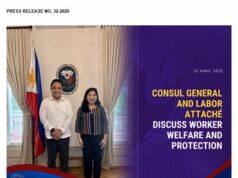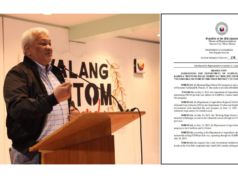CITY OF SAN FERNANDO – The president of the League of Cities of the Philippines (LCP) said yesterday his league will file before the Supreme Court (SC) a second motion for reconsideration (MR) against the high court’s series of “flip-flopping” decisions that, in its latest verdict, granted cityhood to 16 munici-palities.
In an interview with Punto, LCP president Mayor Oscar Rodriguez of this city said, however, that should the high court again junk the second MR, his league is determined to pursue impeachment proceedings against the concerned justices.
“We will not hesitate to file impeachment proceedings against those justices for violating their oath and betrayal of public trust,” Rodriguez said.
He said that the second MR “is an opportunity for the justices to open themselves,” he said.
“We don’t want the Supreme Court to be damaged. If the people can no longer believe the highest court, who will they believe? So we are giving the Supreme Court the opportunity to correct the wrong to save the Court and the country,” he said.
Rodriguez described the “greatest negative impact” of the high court’s ruling as “an attack on the Constitution and the Local Government Code.”
“People will no longer respect the Constitution and the Local Government Code. They will no longer respect decisions which are already final and executory. They will no longer respect closed cases because they can open them anytime,” he said.
Rodriguez recalled that way back in 2008, the high court had already decided on the case with finality, junking cityhood for the 16 municipalities. Succeeding decisions further made such decision “not only final and executory, but already executed,” he stressed.
Last Tuesday, the Supreme Court, in 7-6 votes with two abstentions, reaffirmed its Feb. 15 resolution upholding the constitutionality of the cityhood laws of the 16 municipalities. The tribunal initially declared the cityhood laws unconstitutional in a decision promulgated on Aug. 24, 2010.But on Dec. 21, 2010, the Court reversed itself, then changed its mind again on Feb. 15, 2011.
Laws creating the cities of Baybay City in Leyte, Bogo City in Cebu, Catbalogan City in Samar, Tandag City in Surigao del Sur, Lamitan City in Basilan, Borongan City in Samar, Tayabas City in Quezon, Tabuk City in Kalinga, Bayugan City in Agusan del Sur, Batac City in Ilocos Norte, Mati City in Davao Oriental, Guihulngan City in Negros Oriental, Cabadbaran City in Agusan del Norte, El Salvador City in Misamis Oriental, Carcar City in Cebu, and Naga City in Cebu, were declared constitutional.
Rodriguez said that granting cityhood to these towns clearly violated both the Constitution and the Local Government Code.
He also noted that the 16 municipalities clearly did not comply with the provisions of the Local Government Code, as amended by Republic Act 9009 that took effect on June 30, 2007, which provides requirements namely, having locally generated average annual income of P100 million for the last two consecutive years and contiguous territory of at least 100 square kilometers or a population of not less than 150,000 inhabitants.
In an interview with Punto, LCP president Mayor Oscar Rodriguez of this city said, however, that should the high court again junk the second MR, his league is determined to pursue impeachment proceedings against the concerned justices.
“We will not hesitate to file impeachment proceedings against those justices for violating their oath and betrayal of public trust,” Rodriguez said.
He said that the second MR “is an opportunity for the justices to open themselves,” he said.
“We don’t want the Supreme Court to be damaged. If the people can no longer believe the highest court, who will they believe? So we are giving the Supreme Court the opportunity to correct the wrong to save the Court and the country,” he said.
Rodriguez described the “greatest negative impact” of the high court’s ruling as “an attack on the Constitution and the Local Government Code.”
“People will no longer respect the Constitution and the Local Government Code. They will no longer respect decisions which are already final and executory. They will no longer respect closed cases because they can open them anytime,” he said.
Rodriguez recalled that way back in 2008, the high court had already decided on the case with finality, junking cityhood for the 16 municipalities. Succeeding decisions further made such decision “not only final and executory, but already executed,” he stressed.
Last Tuesday, the Supreme Court, in 7-6 votes with two abstentions, reaffirmed its Feb. 15 resolution upholding the constitutionality of the cityhood laws of the 16 municipalities. The tribunal initially declared the cityhood laws unconstitutional in a decision promulgated on Aug. 24, 2010.But on Dec. 21, 2010, the Court reversed itself, then changed its mind again on Feb. 15, 2011.
Laws creating the cities of Baybay City in Leyte, Bogo City in Cebu, Catbalogan City in Samar, Tandag City in Surigao del Sur, Lamitan City in Basilan, Borongan City in Samar, Tayabas City in Quezon, Tabuk City in Kalinga, Bayugan City in Agusan del Sur, Batac City in Ilocos Norte, Mati City in Davao Oriental, Guihulngan City in Negros Oriental, Cabadbaran City in Agusan del Norte, El Salvador City in Misamis Oriental, Carcar City in Cebu, and Naga City in Cebu, were declared constitutional.
Rodriguez said that granting cityhood to these towns clearly violated both the Constitution and the Local Government Code.
He also noted that the 16 municipalities clearly did not comply with the provisions of the Local Government Code, as amended by Republic Act 9009 that took effect on June 30, 2007, which provides requirements namely, having locally generated average annual income of P100 million for the last two consecutive years and contiguous territory of at least 100 square kilometers or a population of not less than 150,000 inhabitants.



